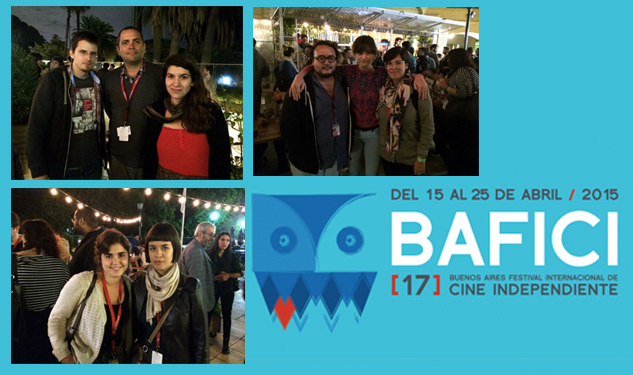
- Industry
Buenos Aires Film Festival Shines Light on South American Film Makers
The Buenos Aires International Independent Film Festival promised to surprise, reveal, awake everyone’s creativity and reinvent a love affair with the audience and the city. As a first time BAFICI attendee my love affair with the city couldn’t be reinvented but it began: The combination of the city’s European architecture and Argentine friendliness certainly stole my heart. I was also taken by the enthusiasm of the young South American filmmakers’ fellow HFPA journalist Barbara Gasser. We met at the Opening Cocktail Party of Buenos Aires LAB (BAL) and Talents Buenos Aires event at Camping, an outdoor restaurant at Recoleta. We talked about movies they have made and the film industries in their countries.
The autobiographical Pretty Ones (Las Lindas) by Melisa Liebenthal, details her evolution from a smiling girl to an awkward and angry teenager. Liebenthal, 24, and Eugenia Campos Guevara, 24, started to film the documentary essay two years ago, when they were studying at the University of Cinema in Buenos Aires. “We felt comfortable shooting a long feature because we had been filming many different projects at school. They push students to make films. Also, we didn’t try to reach for something impossible”, said Campos Guevara, who produced the documentary. “The film is asking why I have to smile, why it is so important to be pretty, why am I mistaken for a man when my hair is short and my voice is deep”, Liebenthal explains.
Both filmmakers have day jobs in cinema and TV. “It is a very interesting moment for Argentinian cinema. We have two different kinds of movies; some have a high budget and financial support. Others are small independent movies. Many young filmmakers are telling different kinds of stories with a small, realistic budget. BAFICI actually tries to nurture them” Campos Guevara told us. “We don’t have a film industry like in Hollywood here. But when you don’t have a big company behind you, you have freedom to tell different kind of stories. It is good to have a salary but then you might not have the same kind of freedom then as an independent filmmaker”, Liebenthal thinks. The duo and Sofia Brado, 25, whose film is about an African immigrant who lives in Buenos Aires, all agree that Wild Tales, the Argentine-Spanish black comedy that was nominated for Best Foreign Language Film this year, has changed things a little bit. “Argentinean cinema is not very popular here because they are not big entertaining productions and they can’t compete with big budget foreign movies. But maybe Wild Tales has encouraged people to go see local movies.”
Chilean director Roberto Doveris, 28, got the idea for his feature The Plants (Las Plantas), in 2011 and he presented the idea at the BAL 2012. “Argentinean songwriter Violeta Castillo inspired me to write a story about a young woman who stays alone in an old house with her ill brother. She is lonely, and gets close to a man she doesn’t know and starts to explore her sexuality”, Doveris said.Rocío Romero, 28, producer of the movie, explains that finding finances from Chile is challenging.
“The movie scene is small in Chile, you can’t call it an industry yet, usually only bigger productions get financing from government or private investors. Smaller ones are financed by doing other jobs and filmmakers usually struggle.” But Doveris, who also works with Cinema Chile that promotes Chilean movies, is optimistic. “In the last 10 years production in Chile has grown because there are more private investors than before. Our films also travel to all big film festivals like Berlin, Guadalajara, Locarno and Buenos Aires. But of course we still need to do more. One big challenge is to get local people to see Chilean movies.”
Uruguayan Frederico Pritsch, 27, who was promoting his documentary Cometas sobre los muros about teenagers, their education, friendships and lives outside of school, agrees. “More and more films get made in Uruguay and the state funds some projects, but there is not enough of an audience for local movies. It is a small territory with 3 million people. Often a movie is in a theatre only one week and can’t compete with the Hollywood movies.”
Venezuelan director Charles Martinez, 35, who is working on the dystopian story
The Factory Impossible, told us that many government-funded movies are made in Venezuela. “This year we have screened 47 films. We have many productions, but the problem is distribution and how to get the public involved. We have hard times with economics and social issues so people don’t go to movies. The situation is improving,
but is still complex. Many young people are making movies, but we don’t have an industry and jobs like in Hollywood.”
Kirpi Uimonen Ballesteros

